From managing busy schedules to dealing with outside influences, mothers have their hands full these days. There is broad agreement among the public that it is harder to be a parent today – especially a mother – than it was in the 1970s or 1980s. Fully 70% of the public says it is more difficult to be a mother today than it was 20 or 30 years ago, while somewhat fewer (60%) say the same about being a father.
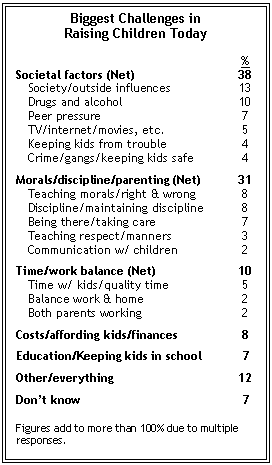
A national survey by the Pew Research Center, conducted Feb.16-March 14 among 2,020 Americans, finds a widespread belief that today’s parents are not measuring up to the standard that parents set a generation ago. Mothers are seen as having the more difficult job, but they are also judged more harshly than are fathers. More than half of Americans (56%) say that mothers are doing a worse job today than mothers did 20 or 30 years ago. By comparison, somewhat fewer people (47%) say fathers are doing a worse job than fathers did 20 or 30 years ago.
The biggest challenge in raising children today, according to parents and non-parents alike, is dealing with the outside influences of society. Nearly four-in-ten Americans (38%) list societal factors when asked in an open-ended format to name the biggest challenge for parents today. Among the top specific concerns mentioned are drugs and alcohol, peer pressure, and the impact of television and other media.
Beyond societal influences, other perceived challenges in raising children include teaching morals and values, maintaining discipline, handling the financial aspects of childrearing, and dealing with the educational system.
The views of mothers and fathers are similar when it comes to the challenges parents face today. Societal factors – including drugs and alcohol, peer pressure, and entertainment media – are the top concern for mothers and fathers alike.
It’s Not Easy Being Mom or Dad
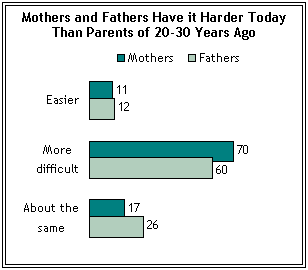
Overall, 70% of Americans say that mothers today have a more difficult job than mothers did 20 or 30 years ago. Fewer than one-in-five (17%) say the job of motherhood is about the same as it was then, while 11% say it is easier today.
By comparison, 60% believe that it is more difficult to be a father than it was 20 or 30 years ago. About a quarter (26%) say fatherhood is about the same as it was a generation ago, while 12% say it is easier.
Men and women express similar views about the difficulty of being a mother or father today compared with the past. However, there are age differences in men’s opinions about the difficulty of being a father today. Fully 70% of men ages 50-64 say being a father is more difficult today, compared with 59% of men ages 30-49, and just 46% of men under age 30.
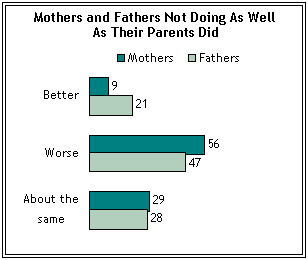
Dads Get Higher Ratings
Fathers today get higher grades than mothers for their performance, especially from women. Overall, 47% of Americans say fathers of children under the age of 18 are now doing a worse job as parents than fathers did 20 or 30 years ago; this compares with 56% who say mothers are doing a worse job. About one-in-five (21%) say today’s fathers are doing a better job compared with fathers a generation ago; far fewer (9%) say that today’s mothers are doing a better job than their predecessors 20 or 30 years ago.
The gender gap in evaluations of fathers is substantial. A solid majority of men (55%) say today’s fathers are doing a worse job than did fathers a generation ago, but just 40% of women agree. Most women say that today’s fathers are now doing a better job (27%), or at least as good a job (29%), as fathers did 20 or 30 years ago. Women are much harder on themselves – 54% say today’s mothers are doing a worse job when compared with mothers 20 or 30 years ago.
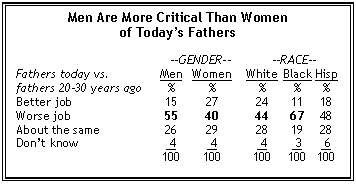
Among men, the fathers of adult children and those who are not parents are the most critical of today’s dads. In each case, 60% say that today’s fathers are doing a worse job than the previous generation of fathers. Dads with children under age 18 have a more positive view of contemporary fathers: 47% say today’s dads are doing a worse job; 20% say they are doing a better job; and 29% say they are doing about the same job as fathers 20 or 30 years ago.
There also is a substantial racial gap in evaluations of today’s fathers. Two-thirds of African Americans (67%) say that today’s fathers are doing a worse job than fathers did 20 or 30 years ago; just 44% of whites agree. Only about one-in-ten blacks (11%) say today’s fathers are doing a better job than did fathers a generation ago, compared with 24% of whites. The racial gap is even larger among women. White women are nearly three times more likely than black women to say fathers are doing a better job today than in the 1970s and 1980s (32% vs. 11% respectively).
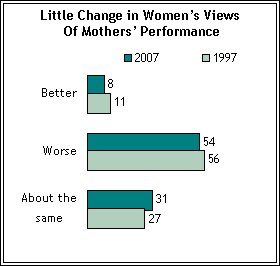
Women’s Views of Mothers: 1997-2007
Women’s views about how well mothers are doing their job have changed little over the past 10 years. In a 1997 Pew Research Center survey of women, a majority (56%) said that mothers of children under age 18 were doing a worse job as parents than mothers did 20 or 30 years ago; in the current survey, 54% of women express this view.
As was the case 10 years ago, middle-aged women are more critical of today’s moms than are younger women. Fully 66% of women ages 50-64 say today’s mothers are doing a worse job. This compares with just 41% of women younger than 30, 56% of women ages 30-49, and 48% of women ages 65 and older.
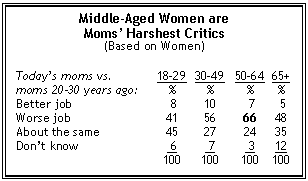
Religious affiliation also influences views on motherhood. White evangelical Protestants are among the most critical of the job today’s mothers are doing. More than two-thirds of white evangelicals (68%) say moms are doing a worse job today when compared with mothers 20-30 years ago. This compares with 54% of white non-evangelical Protestants, 50% of white Catholics, and 47% of seculars.
Motherhood Still Difficult
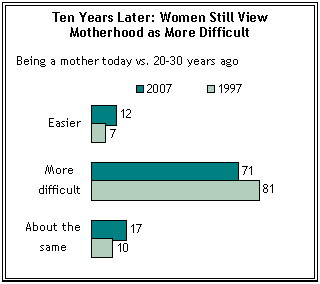
Most women (71%) say it is more difficult to be a mother today than it was 20 or 30 years ago. But in Pew’s 1997 motherhood survey, an even greater percentage of women expressed this view (81%).
Just as older women are more likely to say today’s mothers are doing a worse job, they are also more likely to believe the job has become more difficult. Roughly eight-in-ten women ages 50-64 (81%) say it is harder to be a mother today than it was 20-30 years ago. This compares with 58% of women under age 30, 70% of women ages 30-49, and 73% of women ages 65 and older.
Drugs a Concern for Parents of Adult Children
The challenges facing parents today differ according to the ages of their children. Parents of adult children are more likely to point to societal factors, particularly drugs and alcohol, than are parents with kids under age 18. Fully 17% of parents whose kids are all over age 18 say drugs and alcohol are the biggest challenge in raising children today. This compares with only 4% of parents of younger children. Even among those with teenage children (ages 13-18), just 5% cite drugs or alcohol as the biggest challenge today.
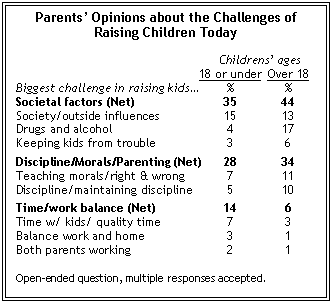
The challenges of balancing work and family life and finding enough time to spend with children are bigger issues for parents with children ages 18 and younger than they are for parents whose kids are grown (14% vs. 6%, respectively).
Religious views and practices also influence opinions about parenting today, especially among parents with chi
ldren under age 18. Among parents of children ages 18 and younger, 42% who attend religious services at least once a week cite societal factors as the biggest challenge in raising kids today. This compares with 29% of those who seldom or never attend church. In addition to general concerns about society, parents who attend services at least weekly are much more likely to mention television and other media as the biggest parenting challenges than do parents who seldom or never attend (10% vs. 3%).
About the Survey
Results for this survey are based on telephone interviews conducted with a nationally representative sample of adults, ages 18 years and older, living in continental U.S. telephone households. The sample design included an oversample of African-American and Hispanic respondents as well an oversample of 18 to 49 year olds. To allow for separate analysis of African-American and Hispanic respondents, a disproportionate number of area code-exchange combinations with higher than average densities of African-American and Hispanic households were sampled. The oversample of 18 to 49 year olds was achieved by screening selected replicates for age-appropriate respondents. The data are weighted to produce a final sample that is representative of the general population of adults in the continental United States.
- Interviews conducted Feb. 16 – Mar. 14, 2007
- 2,020 interviews
- Margin of sampling error is plus or minus 3 percentage points for results based on the total sample at the 95% confidence level. The margin of sampling error is higher for results based on subgroups of respondents.
Survey interviews conducted under the direction of Princeton Survey Research Associates International. Interviews were conducted in English and Spanish.
Bear in mind that question wording and practical difficulties in conducting surveys can introduce error or bias in the findings of opinion polls.




